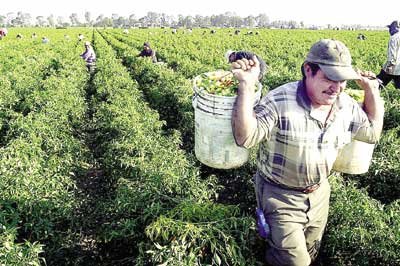South County is weathering an unprecedented labor shortage alongside hundreds of other agricultural communities across California. The pinch is forcing some growers to raise their prices as competition for workers increases, and some have even decided to sell their operation to larger companies.
In light of an energized economy in Mexico, coupled with last year’s record-high deportations, “we heard personal accounts from farmers who struggled to find enough people to work on their farms,” confirmed President Paul Wenger of the California Farm Bureau.
Bureau officials conducted a voluntary survey following the 2012 harvest of more than 700 California farmers – and while the farmers’ crops were varied, the responses were not: Last year, 71 percent of growers saw a shortage of workers during their harvest seasons.
The hardest-hit individuals were farmers who made their living on labor-intensive crops, such as cherries and peppers. This includes Christopher Ranch CEO Bill Christopher, who describes the labor situation as “the biggest shortage we have ever seen.”
Christopher and his family have been farming in west Gilroy since 1956. Today, they are one of the largest agricultural operations in Santa Clara Valley,
processing more than 60 million tons of garlic. Manual farm labor is the only option to get the job done, Christopher explained.
“There is no mechanical means to harvest the crop,” he said. “In 2012 we saw an over 35 percent decrease in labor.”
With less workers in the fields, agriculture productivity throughout California has steadily declined since 2011, according to Bryan Little, Director of Labor Affairs for the California Farm Bureau. This means farmers have to choose between using their hired help for tending to out-of-season crops, or for harvesting those that are ready to be picked.
Operations such as El Camino Packing, located on the southern outskirts of Gilroy, are having to juggle between general farm maintenance and bringing their crops in from the field.
“Everything got harvested, but not as soon as usual,” owner Ralph Santos said of this year’s cherry harvest, which generally falls between May and June.
For growers in Gilroy and Morgan Hill, a lack of hands for hire ultimately results in a “bidding war” to secure the needed help, explained Executive Director Jennifer Scheer with the Santa Clara County Farm Bureau.
And that consequence is “really counter to the cooperative spirit we usually see in agriculture,” she said.
Field labor is paid per bucket, with prices varying depending on the crop. Per bucket ratio generally equates to about $9.50 an hour in California; a dollar increase from last year.
For Santa Clara County, 90 percent of the area’s $247 million in annual agricultural revenue for 2011 came from South County, which includes Morgan Hill, Gilroy and unincorporated areas such as San Martin.
In an industry that is not shy about the fact that 70 percent of their employees are undocumented, according to the California Farm Bureau, changes across the border can hit home – and hard.
Between a government crackdown and an aging Mexican population, there is currently a net zero migration – meaning the amount of people returning to Mexico is the same as those leaving, explained Little, who said this affects the overall number of available workers.
Also playing into the equation: a large spike in deportations last year, according to Immigration and Customs Enforcement. During fiscal year 2011, the number of individuals throughout the U.S. sent back to their country of residence increased by more than 16,000 to 409,842 in 2012. The agency reported that deportations for 2012 were a record high.
Now, as the 2013 legislative session kicks off, agriculturists hope immigration reform is the answer to last year’s growing pains.
“There has been a lot of discussion about creating a new visa program,” explained National Affairs Manager Rayne Pegg with California Farm Bureau.
After numerous failed attempts to reform federal immigration policy in 2012, legislators including Congresswoman Zoe Lofgren for the 19th Congressional District are back to the drawing board.
“It is indeed a serious problem that deserves attention,” Lofgren told the Times.
In the interim, growers have to make due with what is available and are paying close attention to any legislative activity.
“We are hoping something can be done in Washington, because it’s desperately needed,” Christopher said.
Lofgren believes that resolving the immigration issue requires taking the bull by the horns and executing a total transformation.
“At this point, our best path forward is to get a bipartisan bill for top-to-bottom reform,” she insisted.
Closer to home, Jim Wagner, the owner of 101 Livestock in Aromas, took his own initiative by writing and honing an immigration reform proposal.
As an agricultural consultant in Mexico for 10 years, Wagner talked of seeing “both sides” of the issue.
“We don’t want to get cheap labor,” he said. “We want to make it legal and give the workers their dignity.”
For now, the competition for good labor and subsequent wage markups will ultimately get passed along to consumers who will have to pay higher prices.
Paul Mirassou of B&T Farms in Gilroy, which grows peppers, said he was forced to raise his rates by about 50 cents a pound for all of his crops this year.
As growing costs increase and profits decrease, some operations are forced to reevaluate their business plan, while other, smaller farms resolve to sell out to larger operations, according to Scheer.
Mike Ayers of San Martin, who farmed merely as a hobby, chose to close his operation after more than 18 years of growing walnuts. As revenue dwindled, Ayers questioned if harvesting his trees was worth the effort.
“We said that’s just too darn much work. The profit just wasn’t there,” he resolved.
Congresswoman Zoe Lofgren, 19th Congressional District:
• Enforce current immigration laws and secure the borders.
• Create a framework to stop illegal hires and encourage workers to go through a legal process.
• Develop a system that works for families, through legalizing the undocumented.
Jim Wagner, owner of 101 Livestock in Aromas:
• Make it more affordable for workers to cross legally, than illegally.
• Use a specific identification card, not social security, to identify guest workers.
• Require workers to pay 120 days of health and vehicle insurance.













